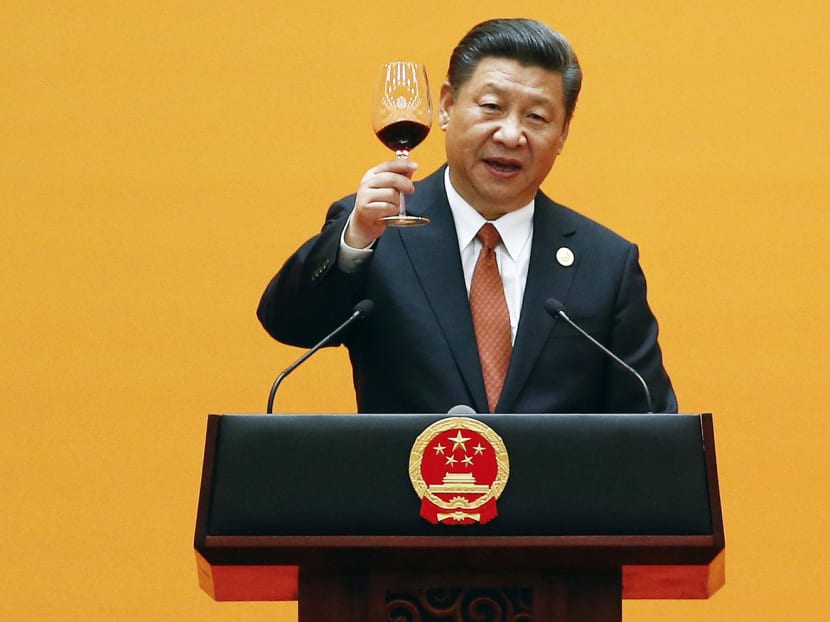Xi pushes for China to be centre of new economic order
BEIJING — Chinese President Xi Jinping delivered a sweeping vision of a new economic global order yesterday, positioning his country as an alternative to an inward-looking United States under President Donald Trump.

Chinese President Xi Jinping making a toast at the welcoming banquet on the first day of the Belt and Road Forum in Beijing yesterday. Leaders from 29 countries are attending the forum, as well as the heads of the United Nations, International Monetary Fund and World Bank. Photo Reuters
BEIJING — Chinese President Xi Jinping delivered a sweeping vision of a new economic global order yesterday, positioning his country as an alternative to an inward-looking United States under President Donald Trump.
The Chinese leader also pledged US$124 billion (S$173 billion) for development banks in China that he said would spearhead vast spending on infrastructure across countries besides forging a path of peace, inclusiveness and free trade, while calling for the abandonment of old models based on rivalry and diplomatic power games.
Mr Xi used the Silk Road summit, attended by leaders and top officials from around the world, to bolster China’s global leadership ambitions as Mr Trump promotes “America First” and adopts a protectionist stance on trade policies.
“We should build an open platform of cooperation and uphold and grow an open world economy,” he told the opening of the two-day gathering in Beijing.
China has touted what it formally calls the Belt and Road initiative as a new way to boost global development since Mr Xi unveiled the plan in 2013. It aims to expand links between Asia, Africa, Europe and beyond, underpinned by billions of dollars in infrastructure investment.
The initiative spans some 65 countries representing 60 per cent of the world population and about a third of global gross domestic product. The China Development Bank has earmarked US$890 billion for some 900 projects.
The project is seen as a practical solution to relieve China’s industrial overcapacity. But it could also serve Beijing’s geopolitical ambitions as Washington retreats into “America First” policies.
Mr Xi said the world must create conditions that promote open development and encourage the building of systems of “fair, reasonable and transparent global trade and investment rules”.
“Trade is the important engine of economic development,” he said.
He pointed out the world must promote the multilateral trade system, the establishment of free trade regions, and the facilitation of free trade.
Mr Xi also pledged a major funding boost to the new Silk Road, including an extra 100 billion yuan (S$20.3 billion) into the existing Silk Road Fund, 380 billion yuan in loans from two policy banks and 60 billion yuan in aid to developing countries and international bodies in nations along the new trade routes. In addition, Mr Xi said China would encourage financial institutions to expand their overseas yuan fund businesses to the tune of 300 billion yuan. He did not give a timeframe for the new loans, aid and funding pledged yesterday.
Leaders from 29 countries are attending the forum, as well as the heads of the United Nations, International Monetary Fund and World Bank.
Singapore is represented by Minister for National Development and Second Minister for Finance Lawrence Wong.
Britain’s Finance Minister told the summit his country was a “natural partner” in the new Silk Road, while Pakistan Prime Minister Nawaz Sharif, a close Chinese ally, praised China’s “vision and ingenuity”.
White House adviser Matt Pottinger said the United States welcomed efforts by China to promote infrastructure connectivity as part of its Belt and Road initiative, and US companies could offer top value services.
China plans to import US$2 trillion of products from countries participating in its Belt and Road initiative over the next five years, said Commerce Minister Zhong Shan.
But some Western diplomats have expressed unease about both the summit and the plan as a whole, seeing it as an attempt to promote Chinese influence globally. They are also concerned about transparency and access for foreign firms to the scheme.
“China is willing to share its development experience with all countries. We will not interfere in other countries’ internal affairs. We will not export our system of society and development model, and even more will not impose our views on others,” said Mr Xi.
“In advancing the Belt and Road, we will not re-tread the old path of games between foes. Instead we will create a new model of cooperation and mutual benefit.”
Mr Xi also said the new Silk Road would be open to all, including Africa and the Americas, which are not situated on the traditional Silk Road.
The idea of cooperation and inclusiveness extends to funding projects and investments along the new trade routes, which are being developed both on land and at sea. It also includes cooperation on financial regulation, anti-terrorism and security.
“We should foster a vision of common, comprehensive, cooperative and sustainable security,” said Mr Xi, in calling for stepped-up action against terrorism and what he called its root causes of poverty and social injustice. AGENCIES








